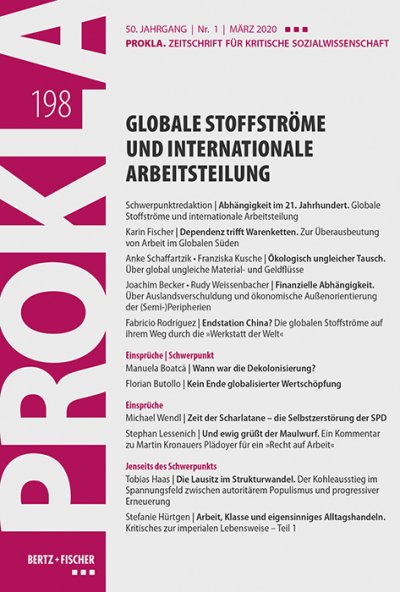Kein Ende globalisierter Wertschöpfung
Warum Erwartungen an eine Rückverlagerung der Fertigung sich nicht erfüllen werden
DOI:
https://doi.org/10.32387/prokla.v50i198.1855Schlagwörter:
Reshoring, globale Arbeitsteilung, Industrie, Beschäftigung, Digitalisierung, Industrie 4.0, GlobalisierungAbstract
Der Beitrag setzt sich kritisch mit dem Argument auseinander, dass in Folge der Digitalisierung der Fertigung eine Rückverlagerung („Reshoring“) industrieller Kapazitäten in Hochlohnländer bevorstehe. Zwar gibt es schon seit Längerem durchaus Trends zu einer stärkeren geografischen Integration von Fertigung und Zielmärkten, die durch die Digitalisierung noch verstärkt werden könnten. Allerdings unterschätzt die Reshoring-These, dass digitale Technologien auch Tendenzen der geografischen Fragmentierung der Fertigung beförderten, die vor allem durch die Weiterentwicklung von Logistik und E-commerce ermöglichet werden. Die internationale Arbeitsteilung ist also nicht durch einseitige Prozesse eines Reshoring, sondern durch eine sektorspezifische Rekonfiguration des Globalen und des Lokalen gekennzeichnet.
Downloads
Literaturhinweise
Andersson, Johanna u.a. (2018): Is apparel manufacturing coming home? (10.2018) URL: http://www.mckinsey.com/~/media/mckinsey/industries/retail/our%20insights/is%20apparel%20manufacturing%20coming%20home/is-apparel-manufacturing-coming-home_vf.ashx, Zugriff: 20.06.2019.
Bailey, David u.a. (2018): ›Home-sourcing‹ and closer value chains in mature economies: The case of Spanish manufacturing. In: Cambridge Journal of Economics 42(6): 1567–1584. DOI: https://doi.org/10.1093/cje/bey020.
Bousonville, Thomas (2017): Logistik 4.0. Die digitale Transformation der Wertschöpfungskette. Wiesbaden.
Butollo, Florian / Lüthje, Boy (2017): ›Made in China 2025‹: Intelligent Manufacturing and Work. In: Briken, Kenrda u.a. (Hg.): The New Digital Workplace: How New Technologies Revolutionise Work. London: 52-61.
Butollo, Florian / Schmalz, Stefan (2017): China: Der Wandel von Arbeit in der Werkstatt der Welt. In: Burchardt, Hans-Jürgen u.a. (Hg.): Entwicklungstheorie heute - Entwicklungspolitik von morgen. Baden-Baden: 175-188. DOI: https://doi.org/10.5771/9783845267340-176.
Dachs, Bernhard u.a. (2017): Bringing it all back home? Backshoring of manufacturing activities and the adoption of Industry 4.0 technologies. URL: http://www.mpra.ub.uni-muenchen.de/83167/, Zugriff: 20.06.2019. DOI: https://doi.org/10.1016/j.jwb.2019.101017.
De Propris, Lisa / Pegoraro, Diletta (2019): Technological disruptions and production location choices. In: Chidlow, Agnieszka u.a. (Hg.): The changing strategies of international business : how MNEs manage in a changing commercial and political landscape. Cham: 221-240. DOI: https://doi.org/10.1007/978-3-030-03931-8_11.
Gabriel, Sigmar (2015): Industrie 4.0 - Made in Germany Namensartikel von Bundesminister Sigmar Gabriel zu den zentralen Themenfeldern von Industrie 4.0 (13.04.2015). URL: http://www.bmwi.de/Redaktion/DE/Namensartikel/2015/20150413-gabriel-industrie-4-0-made-in-germany.html, Zugriff:20.06.2019.
Göpfert, Ingrid (2016): Logistik der Zukunft—Logistics for the Future (7. Auflage). Wiesbaden. DOI: https://doi.org/10.1007/978-3-658-12256-0.
Herrigel, Gary u.a. (2013): The Process of Chinese Manufacturing Upgrading: Transitioning from Unilateral to Recursive Mutual Learning Relations. In: Global Strategy Journal 3(1): 109–125. https://doi.org/10.1111/j.2042-5805.2012.01046.x.
Krzywdzinski, Martin (2017): Automation, skill requirements and labour-use strategies: High-wage and low-wage approaches to high-tech manufacturing in the automotive industry. In: New Technology, Work and Employment 32(3): 247–267. https://doi.org/10.1111/ntwe.12100.
Marx, Karl: (1857/58): Grundrisse der Kritik der politischen Ökonomie. In: Marx-Engels-Werke (MEW), Bd. 42. Berlin.
Pfeiffer, Sabine (2019): Digitale Transformation: Great, greater, tilt ...? Von der Produktivkraft zur Distributivkraftentwicklung. In: Dörre, Klaus u.a. (Hg.), Große Transformation? Zur Zukunft moderner Gesellschaften. Sonderband des Berliner Journals für Soziologie. Wiesbaden: 383-399. DOI: https://doi.org/10.1007/978-3-658-25947-1_21.
Staab, Philipp (2016): Falsche Versprechen: Wachstum im digitalen Kapitalismus. Hamburg.
Zeng, Ming (2018): Smart business: Alibaba, the future of strategy, and what it means for you. Boston.





